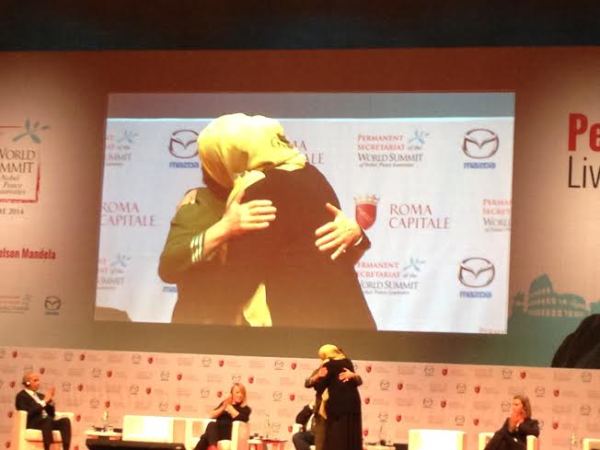Outside the auditorium that hosted the Summit of Nobel Peace Laureates colourful canvases, posters and Tibet flags were displayed to welcome and support the Dalai Lama. It was a very busy morning, with three round tables that happened without a moment’s respite, with a real bombardment of intellectual and emotional stimuli.
The first panel was related to the prevention of inequality, oppression and abuse, in particular related to sexual and gender violence. Once again women gave us the most exciting moments: a T-shirt emblazoned with the phrase Unarmed Civilian, clear reference to the recent protests against police violence in the United States, Jody Williams responded to a question on femicide describing the attitude of devaluing the other as the root of violence that begins in the home, but reaches up to the invasion of countries considered less “valuable”.
With the passion that characterises the Yemenite Tawakkol Karman, the first Arab woman to receive the Nobel Peace Prize, she remembered the steps of the peaceful struggle that turned around the situation in her country: the first victory, she reported, was that weapons were abandoned in a society in which all had plenty, the second were peaceful demonstrations, with flowers and songs, in which millions of people participated, the third was to end the dictatorship and fourth was the dialogues to resolve the future of Yemen . She denounced the destabilising Iranian intervention and the strengthening of Isis, which have reduced the capital Sana’a to the state Damascus and Baghdad find themselves in today. She gave us a remainder that terrorism and dictatorships feed each other and aim at building walls between nations, dividing societies.
Precisely at this point was that one of the most exciting moments of the Summit occurred: the Iranian Shirin Ebadi, a lawyer in exile for her struggle in defence of human rights, got up and hugged Tawakkol, apologising for her country’s interference. While the two women held each other in an incredibly moving embrace, the entire room stood up to applaud with a sustained ovation.
And so we came to a moment of the opposite sign: the former Italian Minister of Foreign Affairs Federica Mogherini, now head of European diplomacy, speaking on behalf of the European Union – one of the least deserved Nobel prizes, together with those granted to Obama and before him Kissinger. The same question was put to her – how can Europe help the rest of the world out of the nightmare of inequality? – Looks amazing if you think about the conditions to which it has reduced Greece due to austerity measures from the Troika, or the drama of the “illegal” immigrants, treated as criminals by the harsh immigration laws of “Fortress Europe”. Her call to ensure access to resources and rights, as well as her mention of the European Union’s responsibility in this regard left us with a nasty taste of hypocrisy in the mouth.
A feeling that was reinforced when Melissa Fleming, the United Nations High Commissioner for Refugees defined 2014 as the worst year for the increasing number of refugees – 22,000 people daily forced to leave their home – and described the conditions of particular vulnerability of women and children, for whom the flight to another country can be as dangerous as the situation from which they escape.
The second panel of the morning, moderated by journalist Giulietto Chiesa, discussed examples of reconciliation in divided communities and counted among its participants on three Irish players – Lord David Trimble, Mairead Maguire and Betty Williams – who in various ways have contributed to the achievement of a peaceful solution and end to the sectarian violence. During the discussion a dramatic problem became manifest, which would also emerge in the next round table: the enormous military expenditure, while peace, disarmament and combating climate change does not receive sufficient funds. In an austere tone that did not diminish his commitment, Colin Archer of the International Peace Bureau announced a global campaign on this issue.
We brightened up with the poignant video that tells the story of the Children’s Peace Prize, given since 2005 to children and young people who have fought for the rights of others, among whom is Malala, who this year won the Nobel Peace Prize for her fight for the education of youth. All of them have shown an inner strength and an admirable ability to act with consistency and compassion; as the video says “from them we can learn that change starts in schools, on the streets and in the mind.”
The last panel was about the role of international institutions in preventing war. Representatives from well known organisations committed to the cause of nuclear disarmament or the prohibition of chemical weapons and mines, discussing the terrible picture of the possible consequences of a nuclear explosion, denouncing the enormous influence of the military-industrial complex and calling on scientists that their skills are not used for destructive purposes.
The morning concluded with a lighter and at the same time deep note by the Dalai Lama, who took to the stage with a strange hat with a wide brim: he invited to collect from the public, especially the youth, difficult questions. And they came as requested. Students from a school in Rome asked him how courage is learned in a society full of fears, and again he developed the theme of compassion as the basis of human nature. He also emphasized the importance of truth and honesty, friendship and trust as sources of happiness for a humanity that is more mature due to all the violence experienced during the past century.






